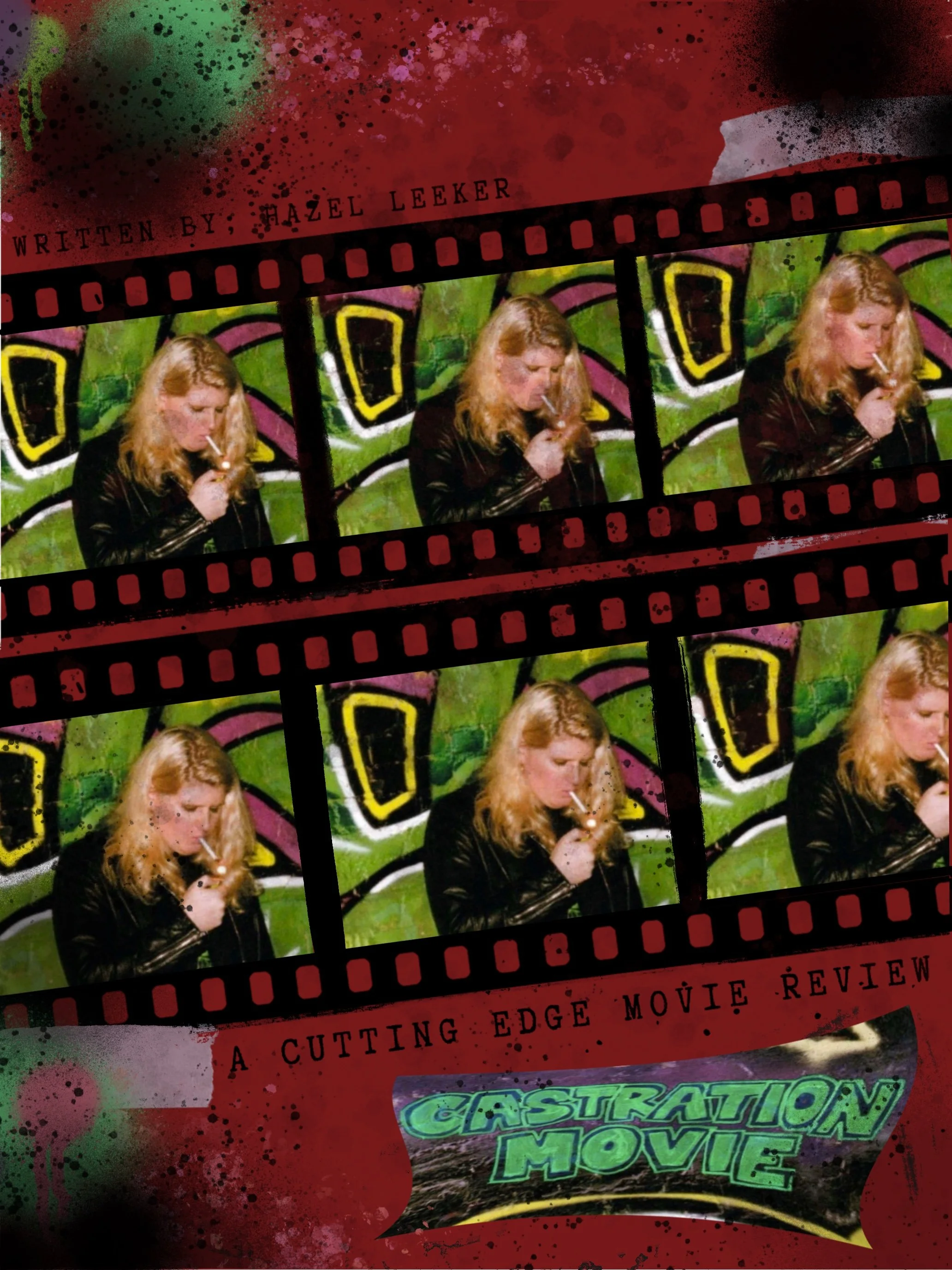‘Castration Movie Anthology I: Traps’ A Funny, Painful, and Horrifyingly Accurate View of the Experience of Existing while Trans
Written by Hazel Noelle Leeker
Graphic by Ellie Edwards
It’s hard to find a portrayal of living as a trans person more accurate than “Castration Movie Anthology I: Traps.” There are several examples of media which attempt to or even directly show something akin to the trans experience; be it through allegory, innuendo, symbolism, or more to explain the pain, fear, disgust, and joy that comes with being transgender. Some are better than others, such as “I Saw The TV Glow,” providing a direct view of how being born in the wrong body and living in a fake world can cause a person to slowly shrivel and die over the course of their lives. While not outright stating it within the movie’s dialogue, in a metatextual sense, “I Saw The TV Glow” portrays the struggle that trans people living in the closet suffer every single moment. “Castration Movie Anthology I: Traps,” on the other hand, goes in a different direction in showing the transgender experience.
“Castration Movie Anthology I: Traps” is the brainchild of Louise Weard, a writer, director, and cinematographer, living in Vancouver, Canada, who has worked in the film industry for over a decade. I was lucky enough to get to interview her, and all information contained herein is from the interview, her substack pages, her twitter, and other places where her work can be found.
The first part of the film, shockingly enough, is not about trans people directly. Chapter one, “incel superman,” is a biting depiction of a man’s radicalization into inceldom through his own inadequacies as a partner, and the culture he finds himself in (as well as a helping hand from 4chan). Turner, a production assistant working on the set of some unimportant film, is the “incel superman.” This chapter title stems from the monologue that Turner has at the start of the film, about Superman and what he thinks that Superman as a character means to the broader culture at-large. He’s a poor partner to his girlfriend, Brooklyn; acting passive and uninvolved unless pushed or prodded. He seems to prioritize his fantasy of being a prolific writer and director, as well as spending time with his friends rather than with Brooklyn.
Turner radicalizes himself through his laziness and his disregard for the woman he supposedly loves. To him, she’s little more than a means to an end, to create the life that he’s been told he needs to live by the patriarchal society at large. He’s just using her to build his own fantasy, never really caring about her or her feelings. In an early scene, while Turner and Brooklyn are laying in bed, Turner is in Brooklyn’s arms, being held by her. Throughout this chapter, Turner never gives Brooklyn the affection that she tries to give him, even with her constantly pushing him to do so. The few times he holds her at all is an awkward hug at a venue she’s selling her art at, and when they fail to have sex. All Turner can do is take, but he can’t truly give. His inability to care about Brooklyn means all he can do is leach affection out of her.
The second chapter of this movie, “traps swan princess,” is centered around Michaela “Traps” Sinclair, a trans woman and sex worker, as she navigates a world not designed for people like her. Her story is familiar to many trans people, but trans women specifically. Almost every trans woman knows someone or has friends who do sex work in some form; I myself have a huge amount of friends doing it, and if I’m being frank, I’ve considered it myself as a way to pay for college. Trans women are sometimes seen as a fetish, an object to satisfy a cishet man’s desire. For these cishet men, they will never see trans women as actual women. We see this with Michaela’s “boyfriend,” Christian, who tries to throw her away when she wants more than just meaningless sex, a real relationship rather. To Christian though, she’s just a fetish.
Traps is dealing with too many unfortunate situations all at once. She’s struggling with wanting to be a mother, as well as trying to be there for the people around her. She’s in a balancing act, all while dealing with her own self-hatred. She says a lot of mean things to the people around her, both because of the stresses in her life and the animosity she holds towards herself. In one particular scene, she says something incredibly nasty to her friend Adeline because of the stress she’s been going through, and because Adeline is trying to come into her own as a woman without Traps’ hand-holding. Traps was the one who helped Adeline get on estrogen, and was a mother-figure for her for so long. Because of her difficulty with becoming a mom, she treats Adeline almost like a daughter, and when she sees her trying to figure herself out, it causes her to lash out. Traps is a relatable figure for a lot of trans women because of the horrible problems she goes through in her job and her personal life, as well as the nitty gritty that trans women have to do to survive.
One of the most important scenes, in my opinion, is the scene where Traps gives herself her estrogen injection. We see every step she takes to prepare, and watch her jam the needle into her leg. Throughout this scene, a song titled “Injection Day” plays. The song feels like the inner thoughts of Traps while she does her injection. We can hear the hatred for herself in the singer’s voice, and the worry she still has about doing the injection. Even when she’s done her injection a thousand times, it’s hard for her to get over the fear of the needle.
On a technical level, this film is very stripped down. The film was shot on Louise’s childhood camera, and because of the difficulty in finding film for it, many of the scenes were shot by taping over old home movies from her childhood. This element gives the film a feeling of nostalgia. The film feels like a project a bunch of friends would make together, simply because it sounded like a fun time. However, there’s still finesse in its production, showing a level of talent and skill from both the cast and the crew, which makes the film a joy to watch. Even with its runtime being over four and a half hours, the film is paced perfectly. Not a moment of this film feels self-indulgent, and it justifies its runtime completely.
This has become one of my favorite films of all time, and even though it can be an incredibly uncomfortable watch at times, this is a must-see film for anyone who values independent voices in the film industry, as well as films made by and for queer people.
Louise Weard’s Socials:

